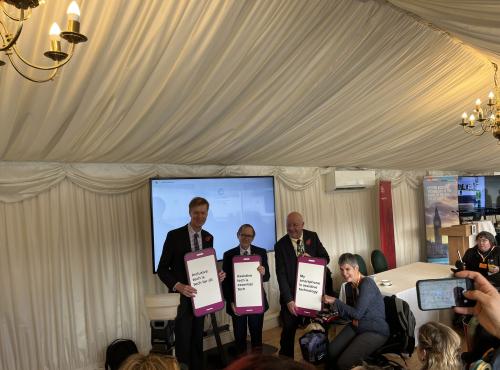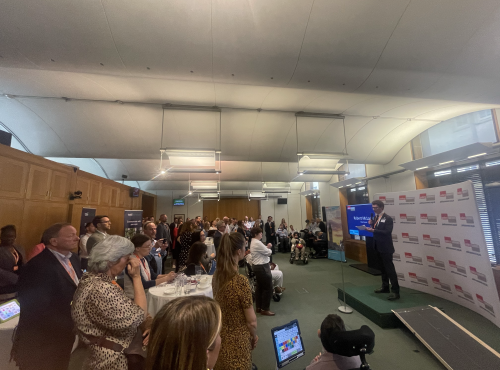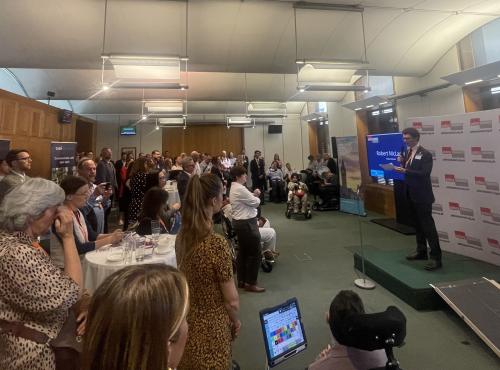Smarter Homes for Independent Living
How can technology help older and disabled people live more independently in their homes?
Smart home technology is a huge opportunity for disabled and older people to take control of their lives. Much of this tech is now widely available. Ofcom estimates that half of all UK homes now have a smart speaker. This technology – of which speakers are just one example – can be used by older and disabled people to live independently with more choice and control over their lives.
But unless we provide the right support services and design tech together with disabled and older people, tech may instead become a barrier pushing people further away from our increasingly digitalised society.
In a new Policy Connect report, Commission chair Sir Paul Carter CBE and author Clive Gilbert discuss good practice case studies of the impact smart home technology can have. The report outlines tangible actions for government and industry to help people take full advantage of tech.
When we get it right, smart home tech works alongside people’s care networks rather than replacing social contact. It can reduce financial pressures on the NHS and the social care system.
“I have macular degeneration and extreme sight loss. I use devices such as a robot vacuum cleaner, water heater and signal device to enable pouring hot water. Amazon Echo does lots of things. [My concern is that] I don’t know all the things that may be available and I need someone to set them up and teach me to use them. I need help when they go wrong or need re-setting. Social care or some local support agency could contact me and help me get what I need. I don’t know how you contact the right person. My son has done all of the setting up, but he lives a very long way away.” – Audrey B, a user of smart home tech who gave evidence to the Commission
“[I use smart home technology to] Control devices like lights and plugs for appliances. As someone with a disability, smart devices have had a major positive impact on my life. It gives me far more independence when I am alone at home. I sincerely hope that the future evolution will continue to ensure inclusive design for people with disabilities.” – An anonymous user of smart home tech, giving evidence
“Many disabled and older people have not benefited from the dramatic growth of the consumer smart home market in recent years. The lessons of the pandemic and the vision for adult social care set out in the White Paper present an opportunity for ministers to ride the current wave of social and technological change and renew the government’s commitment to protect disabled and older people’s right to live the lives they deserve and improve their quality of life. Our proposals set out how they can seize that opportunity.” – Sir Paul Carter CBE
“Our recommendations will help millions of disabled and older people lead more fulfilling lives by putting their needs and aspirations at the centre of technology design and care services. Independent living has long been a key tenet of the disability rights movement. With the ageing society, this demand is being embraced by a growing section of society. With appropriate support from carers, family members and friends, smart home technology promises to give people more choice and control in their lives. To achieve this, we must reform the way technology is used in health and social care services. The technology market must also be made to work better for disabled and older consumers.” – Clive Gilbert
With thanks to the report's sponsors, Bournemouth University and Coventry University. Professor Lee-Ann Fenge and Professor Sally Dibb, from Bournemouth University and Coventry University respectively, sat on the steering group and gave evidence to our sessions.
“Independent living and smart home technology should enhance wellbeing and social inclusion to support people to live their best lives. As part of this it is important that older and disabled people are involved in decision making and the development of high-quality evidence of the impact of technology on their lived experience. This requires a commitment to co-producing new solutions based on the peoples’ experiences and a need to respond to issues of access and digital exclusion.
“All disabled and older people should have equal access to person-centred smart technology to enable them to live the lives they wish to live. Within a challenging national context of social care provision, it is essential that independent living is prioritised within sustainable funding and resource structures, to support the independence, health and wellbeing of all disabled and older citizens.” - Professor Lee-Ann Fenge, Professor of Social Care at Bournemouth University“At this crucial time for health and social care, effective policies are needed that will enhance the use of assistive technologies to enable all those in society to live well. This report draws on the combined expertise of healthcare practitioners, the scientific community, policymakers, business and the third sector, to develop a forward-looking set of recommendations.
“I am delighted that Coventry University has been able to sponsor this report and to contribute to the evidence sessions. The holistic approach taken by Policy Connect in examining this complex issue, has enabled the joined-up thinking necessary to bring about much-needed change. The emphasis placed on the needs of users and carers who can benefit from these technologies is to be commended - resulting in findings that reflect the needs of those who are most important. I particularly welcome the recommendations to improve access to innovative assistive technologies for older people and those with disabilities.
“Every member of our population has the right to live independently and well. The Smart Homes and Independent Living Commission recommendations are an important step towards achieving this goal.” - Professor Sally Dibb, Coventry University’s Centre for Business in Society
This is not an official publication of the House of Commons or the House of Lords. It has not been approved by either House or its committees. All-Party Parliamentary Groups are informal groups of Members of both Houses with a common interest in particular issues. The views expressed in this report are those of the group.



